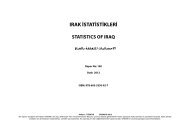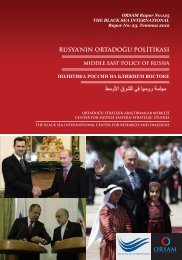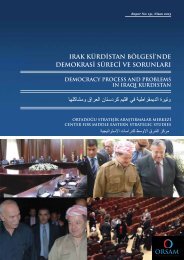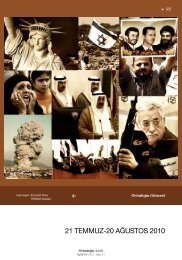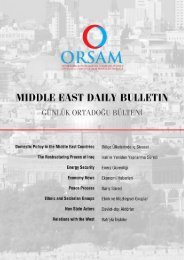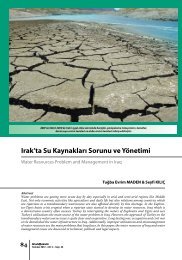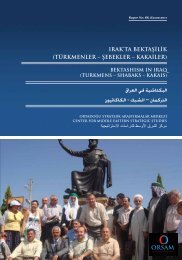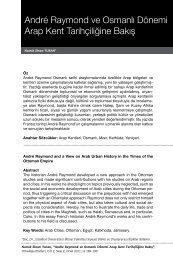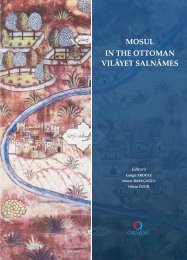turkmen in iraq and their flight - orsam
turkmen in iraq and their flight - orsam
turkmen in iraq and their flight - orsam
Create successful ePaper yourself
Turn your PDF publications into a flip-book with our unique Google optimized e-Paper software.
TURKMEN IN IRAQ AND THEIR FLIGHT: A DEMOCRAPHIC QUESTION<br />
the reason for migration was not primarily to<br />
f<strong>in</strong>d job or earn money but conflict, war, terror<br />
<strong>and</strong> fear of persecution. As a rule of thumb, the<br />
readers should yet <strong>in</strong>spect these figures with<br />
caution as there were no means to test the representativeness<br />
of the sample we have used <strong>in</strong><br />
this survey.<br />
Irregular Migration<br />
Type of migration for Iraqi Turkmen was not<br />
so different than <strong>their</strong> contemporary migrant<br />
fellows all around the world: They had to f<strong>in</strong>d a<br />
way to flee Iraq, a war zone. Thus they have often<br />
crossed borders without necessary papers<br />
<strong>and</strong> permissions. 50% of Turkmen have entered<br />
<strong>their</strong> country of dest<strong>in</strong>ation without a visa. This<br />
could be potentially the highest proportion of<br />
illegal migration recorded <strong>in</strong> migration studies<br />
literature. As shown <strong>in</strong> Figure 22, another 17%<br />
of Turkmen entered <strong>their</strong> dest<strong>in</strong>ations on tourist<br />
visas <strong>and</strong> then they overstayed. This can also<br />
be added to the irregular migration tally. Then<br />
only a third of Turkmen migrants followed a<br />
legal pathway enter<strong>in</strong>g <strong>their</strong> dest<strong>in</strong>ation countries<br />
on visas or permits allow<strong>in</strong>g them to stay<br />
as residents or temporary residents (33%).<br />
Of course, we are not <strong>in</strong> a position to blame<br />
Iraqi Turkmen for illegal migration. Like <strong>their</strong><br />
fellow migrants <strong>in</strong> other parts of the world,<br />
when there were no regular ways to migrate<br />
available, they had to improvise <strong>and</strong> f<strong>in</strong>d a way<br />
to get out of Iraq.<br />
Figure 21: Changes <strong>in</strong> Employment: Before <strong>and</strong> After Migration<br />
Information about Dest<strong>in</strong>ations <strong>and</strong> Composition<br />
of Migrant Groups<br />
Migrants are often target<strong>in</strong>g countries about<br />
which they have some <strong>in</strong>formation. Familiarity<br />
helps <strong>in</strong> the journey <strong>and</strong> <strong>in</strong> the aftermath.<br />
Only <strong>in</strong> desperate situations, such as sudden<br />
attacks or <strong>in</strong> reaction to natural hazards, people<br />
flee to wherever they can reach <strong>and</strong> get<br />
access to. 39% of Iraqi Turkmen had no <strong>in</strong>formation<br />
about the country where they migrated<br />
prior to <strong>their</strong> move. Job opportunities<br />
www.<strong>orsam</strong>.org.tr<br />
45




